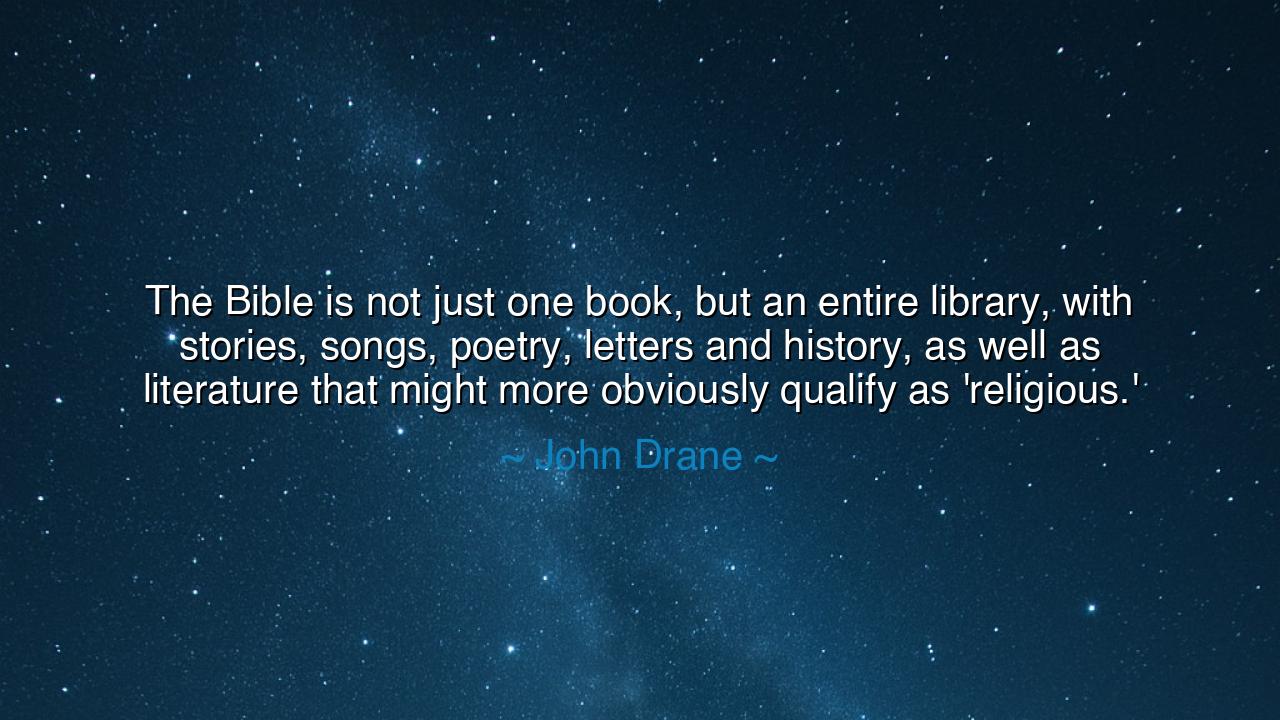
The Bible is not just one book, but an entire library, with
The Bible is not just one book, but an entire library, with stories, songs, poetry, letters and history, as well as literature that might more obviously qualify as 'religious.'






Hear, O seekers of wisdom, the words of John Drane, who reminds us: “The Bible is not just one book, but an entire library, with stories, songs, poetry, letters and history, as well as literature that might more obviously qualify as ‘religious.’” This is no light observation but a profound unveiling, for too often men see the Bible as a single, rigid scroll, forgetting that it is a great treasury of voices gathered across centuries, a river fed by many springs. It is not merely doctrine—it is the living record of humanity’s wrestling with the divine, a library of human longing, fear, triumph, and faith.
For within its pages lie stories of heroes and wanderers, kings and prophets, saints and sinners. The book of Genesis does not merely recount creation—it tells of human beginnings, of exile and promise. The histories of Samuel and Kings recount the rise and fall of nations, the deeds of rulers, and the consequences of their pride. These are not only religious accounts—they are chronicles of humanity itself, bearing lessons of leadership, corruption, sacrifice, and hope. To read them is to walk beside our ancestors and feel the pulse of their lives.
Yet alongside history lie songs and poetry, those timeless outpourings of the soul. The Psalms sing of despair and joy, fear and trust, as true to the human heart today as they were to the shepherd-king David who composed them. The Song of Solomon whispers of love’s passion, while Lamentations cries out in grief over a city in ruins. Here we see that the Bible does not shy away from the full range of human emotion. It gives us permission to weep, to shout, to rejoice, to question—and in all of these, to encounter God.
And then there are the letters, the epistles of Paul and others, written to scattered communities, wrestling with doubt, persecution, and the shaping of a new way of life. These are not abstract philosophies—they are urgent, living words, penned to guide real people in their struggles. They stand as reminders that faith is not lived in isolation but in community, with all its tensions and triumphs. The letters remind us that wisdom must be both spoken and heard, passed on in love and challenge.
Consider how this library has shaped history. In the American civil rights movement, leaders like Martin Luther King Jr. drew from its pages not only commandments but also poetry and prophecy. His speeches resounded with the cadences of Amos crying for justice, of Isaiah promising freedom, of the Psalms singing hope. He understood, like Drane, that the Bible was not one narrow voice but a chorus, and that in its many genres lay the strength to inspire both courage and compassion. Without this vast treasury, the movement would have lacked its poetic fire and prophetic authority.
The meaning of Drane’s words, then, is clear: to read the Bible rightly is to approach it as a library, not as a single monotone. It is to embrace its diversity and see in that diversity its true power. It is to let history teach us humility, poetry awaken our souls, stories kindle our imagination, letters guide our communities, and yes, religious teachings shape our faith. Those who approach it with a narrow mind risk missing its fullness; those who see it as a vast library discover its inexhaustible riches.
Therefore, O children of tomorrow, learn this lesson: do not read sacred texts—or any great work—as if they were one thing only. Seek out the many voices within them. When you read the Bible, take time to sit with a story, sing a psalm, ponder a letter, wrestle with a prophecy. Let its poetry speak to your heart, its history to your mind, its letters to your relationships. For the soul grows not by one food alone, but by a banquet of wisdom.
And so, remember the charge of John Drane: the Bible is a library. Treat it as such. Wander its halls with patience. Open its many doors. Listen to the different voices, and let them shape you. For in their harmony and tension, in their sorrow and joy, you will find not only religion, but the whole drama of humanity reaching out for the eternal. This is the gift of the library of God.






AAdministratorAdministrator
Welcome, honored guests. Please leave a comment, we will respond soon